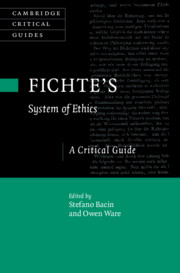Book contents
- Fichte’s System of Ethics
- Cambridge Critical Guides
- Fichte’s System of Ethics
- Copyright page
- Contents
- Contributors
- Acknowledgments
- Abbreviations and Translations
- Introduction
- Chapter 1 Fichte’s Ethics as Kantian Ethics
- Chapter 2 Fichte on Normativity in the Late Jena Period (1796–1799)
- Chapter 3 Fichte on Autonomy
- Chapter 4 Feeling, Drive, and the Lower Capacity of Desire
- Chapter 5 Fichte and the Path from “Formal” to “Material” Freedom
- Chapter 6 Fichte on the Content of Conscience
- Chapter 7 Fichte’s Theory of Moral Evil
- Chapter 8 Embodiment and Freedom
- Chapter 9 Ethics as Theory of Society
- Chapter 10 My Duties and the Morality of Others
- Bibliography
- Index
- Cambridge Critical Guides
Chapter 2 - Fichte on Normativity in the Late Jena Period (1796–1799)
Published online by Cambridge University Press: 20 May 2021
- Fichte’s System of Ethics
- Cambridge Critical Guides
- Fichte’s System of Ethics
- Copyright page
- Contents
- Contributors
- Acknowledgments
- Abbreviations and Translations
- Introduction
- Chapter 1 Fichte’s Ethics as Kantian Ethics
- Chapter 2 Fichte on Normativity in the Late Jena Period (1796–1799)
- Chapter 3 Fichte on Autonomy
- Chapter 4 Feeling, Drive, and the Lower Capacity of Desire
- Chapter 5 Fichte and the Path from “Formal” to “Material” Freedom
- Chapter 6 Fichte on the Content of Conscience
- Chapter 7 Fichte’s Theory of Moral Evil
- Chapter 8 Embodiment and Freedom
- Chapter 9 Ethics as Theory of Society
- Chapter 10 My Duties and the Morality of Others
- Bibliography
- Index
- Cambridge Critical Guides
Summary
The aim of this chapter is to arrive at an understanding of Fichte’s metaethics that integrates two parallel accounts of what he variously called the “instinct of reason” (in the Wissenschaftslehre nova method lectures, 1796–1798) and our “moral nature” (in the System of Ethics of 1798). The chapter first characterizes Fichte’s metaethics as theoretical (i.e., not directly concerned with practical deliberation or action) and idealist (i.e., as avoiding both naturalist and supernaturalist metaphysics along with causal explanation in general). While it is accurate to label Fichte’s approach “transcendental,” the chapter argues that both accounts ultimately introduce a theological element, namely, the idea of God. The role of God turns out to be a “necessary idea” within Fichte’s genetic explanation of our moral nature, without reducing to any form of supernaturalist metaphysics.
- Type
- Chapter
- Information
- Fichte's System of EthicsA Critical Guide, pp. 28 - 46Publisher: Cambridge University PressPrint publication year: 2021

